Alison Sydor inducted into Canada’s Sports Hall of Fame
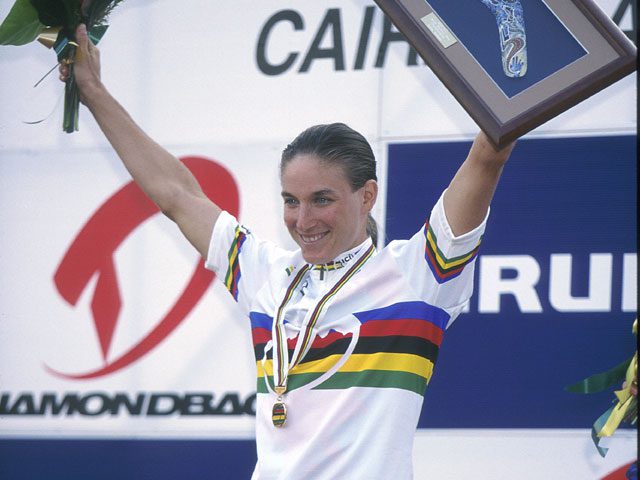
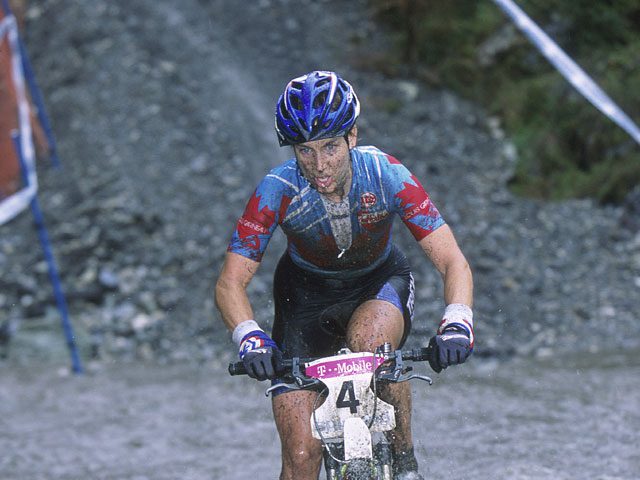 Four years after retiring from a 25-year-long racing career, Alison Sydor will receive one of the nation’s highest sporting honours for her accomplishments. On Oct. 16, Sydor will be one of 11 inspiring athletes and sport builders to be inducted into Canada’s Sports Hall of Fame during the 2013 induction celebrations in Toronto. But for much of this year, the former world-class cyclist has been kicking back, relaxing, and living her life the way a pro mountain biker never could.
Four years after retiring from a 25-year-long racing career, Alison Sydor will receive one of the nation’s highest sporting honours for her accomplishments. On Oct. 16, Sydor will be one of 11 inspiring athletes and sport builders to be inducted into Canada’s Sports Hall of Fame during the 2013 induction celebrations in Toronto. But for much of this year, the former world-class cyclist has been kicking back, relaxing, and living her life the way a pro mountain biker never could.
This spring, Sydor boarded a plane to attend a press conference about her upcoming induction into the Hall of Fame. It was the first plane she’s been on in three years, since she decided to stop racing after winning the 2009 cyclocross national championships. In that time, she also decided to get a dog, part Yorkshire terrier and part poodle, to keep her company on long hikes during the summer, and a set of cross-country skis to keep her busy during the winter months – all part of a series of changes she made to get the most out of her life after competitive cycling. “I don’t ride that much these days,” Sydor admitted. “I didn’t do any sport for a year after I retired. My mind and body needed a break. I got totally out of shape. I was out of breath walking the dog uphill.
“I finally got a dog because I don’t travel anymore. Being a professional athlete was full-on. I was very serious and committed to cycling. I never took time to do other things. I just trained and raced and raced and raced. Not that it was at all bad; it was a great way to live. But over the last few years, I’ve been catching up on some lost time. I did a cycle tour and it was probably the most fun thing I’ve ever done on a bike.”
Before the press conference, Sydor had read the nomination letter written by her former teammates and national team coach Karen Strong, along with input from Cycling Canada Cyclisme, that acknowledged her as one of the nation’s most prized sports figures. It quite affected her. “Reading the letter they wrote was very touching and it really meant a lot to me that they did this. I guess it’s a sign of getting older, or maybe wiser, that this letter means more to me than all the medals,” Sydor said.
“Receiving an honour like this is a bit unexpected and a great surprise. It’s hard to compare this specifically to any race result, it kind of stands alone as just an amazing way to have my career in sport summed up. For any Canadian athlete, being inducted into Canada’s Sports Hall of Fame is about the ultimate compliment.”
Sydor became hooked on cycling after watching Steve Bauer win a medal in the road race at the 1984 Los Angeles Olympic Games on television. As with many Canadians, she watched his career flourish as a professional cyclist when he wore the yellow leader’s jersey at the 1988 and 1990 Tours de France for a total of 14 days, and when he placed second at Paris-Roubaix.
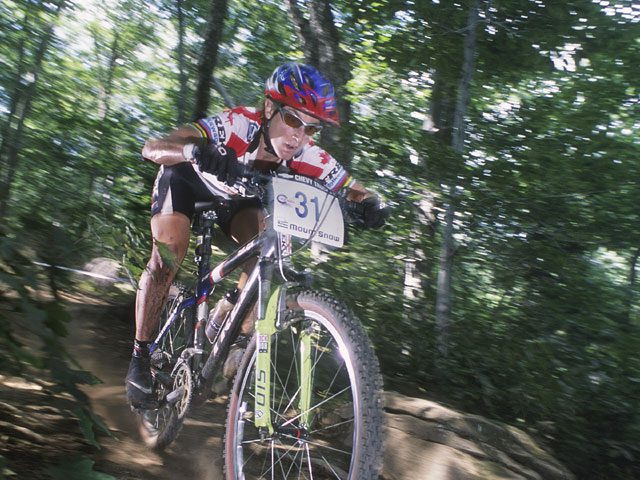 “I didn’t know people raced bikes,” Sydor said. “I was flipping through channels and saw Steve get the silver. Watching bike racing for the first time on television really caught my attention and I wanted to look more into the sport. During my early years, watching Steve at the Tour and at other races, he was the pinnacle of Canadian cycling at the time.”
“I didn’t know people raced bikes,” Sydor said. “I was flipping through channels and saw Steve get the silver. Watching bike racing for the first time on television really caught my attention and I wanted to look more into the sport. During my early years, watching Steve at the Tour and at other races, he was the pinnacle of Canadian cycling at the time.”
Sydor, who was born in Edmonton and grew up in Calgary, started getting together with the local group ride in Victoria where she was studying. It offered a way to meet new people and she fell in love with the sport. It wasn’t long before she started road racing, which progressed quickly with help from pros who were training in the area, such as Bauer, Alex Stieda and Brian Walton.
“One of the things that drew me to the sport at the very beginning was the social aspect,” Sydor said. “Those guys weren’t just great cyclists and pros, they were also really good guys. They weren’t chauvinistic and they had no problem with a young national team female riding with them. It’s not always a supportive environment, but those guys were really important in my development.”
Sydor spent five years racing with the women’s national road team where she gained international experience, built a competitive edge and made lasting friendships with her former teammates. She ended her road career after the 1992 Olympic Games in Barcelona and turned her undivided attention to the up-and-coming sport of mountain bike racing.
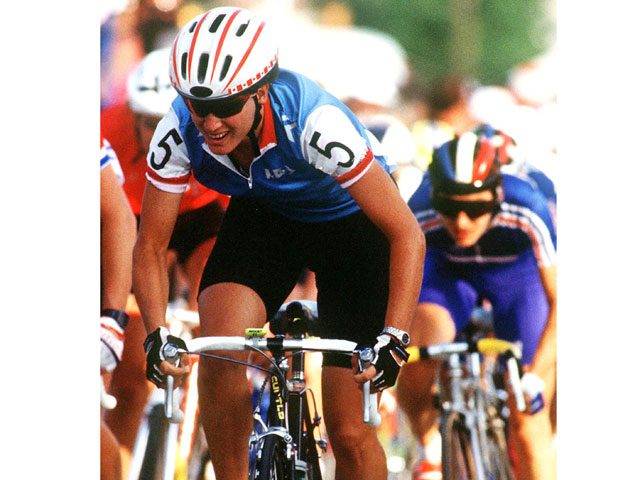 “As difficult as it may be for younger people to understand, there was, at one point, a world without mountain bike racing,” Sydor said with a laugh. “I started on the road when there wasn’t mountain bike racing.”
“As difficult as it may be for younger people to understand, there was, at one point, a world without mountain bike racing,” Sydor said with a laugh. “I started on the road when there wasn’t mountain bike racing.”
Mountain biking was quickly gaining popularity as a mainstream activity on the West Coast and it was developing as a competitive sport with the first cross country world championships held in 1990 in Durango, Colo. Sydor followed the trend and focused her training on performing well at the 1992 cross country world championships in Bromont, Que.
“I thought that might be my only chance to do a cycling world championship in Canada, so I started mountain biking just to see if it was worth pursuing or if I liked it,” Sydor said. “I walked down every descent during the first World Cup, which I won. That is totally unheard of now and there’s no way you could do anything like that and get any result.”
Sydor improved her form and worked on her technical skills. She progressed quickly and ended up securing the silver medal at the worlds in Bromont. It was the start of a long career in world-class mountain biking.
“Mountain biking came along and I was in the right place at the right time,” Sydor said. “I realized I was good at the sport. Obviously, if you’re successful, then you’re more interested, so that silver medal helped. I also came into mountain biking at a really interesting time because it was new, exciting and there were opportunities for being professional.”
In anticipation of Bromont, the national federation started putting more funding into mountain biking and brought on Yuri Kashirin as head coach. Sydor became more organized with her training and employed the latest training tools and equipment technology. Most of all, she enjoyed the new atmosphere and her teammates on the national mountain bike squad.
“Being a part of the national team at the time was great and that was worth a lot more than having all your power-meter and heart-rate data dialed,” Sydor said. “When it came time for worlds, I threw all that stuff away and just enjoyed the time with the team. Being happy is so helpful to producing results. You can be super fit but unhappy and produce nothing.”
Sydor made a mark on the mountain bike world. During 13 consecutive years of racing, she won three world titles from 1994 to 1996 and never placed outside of the top five at the world cross country championships. She also secured the silver medal at the 1996 Olympic Games in Atlanta along with additional medals at the Commonwealth Games and Pan American Games.
“I’m fortunate to have had a lot of good results and memories,” Sydor said. “It’s hard to pick out some of the best, but winning worlds for the first time was very special. That answered the question of ‘how far could I go?’ Getting to wear the rainbow jersey was such an awesome symbol. It always had a huge effect on me. Each time I won created lasting memories but there was something special about the first one. Things were different and more innocent because the sport was still pretty ragtag compared to today. There was less funding, more fun, and it was less serious, even though everyone was working hard. That made the result more enjoyable.”
In late 2009, after an incredible cycling career in road, mountain biking and cyclocross, Sydor retired from the sport. Even with all of her success, there are still some regrets. “I’m glad I have an Olympic silver medal and I’m totally satisfied with the three world championships that I take from my career,” she said. “But, I never had my best race of the season at the Olympic Games and that’s disappointing as an athlete. Anytime you have the capability to win at the top level and you don’t makes you wonder why. Every athlete wants to have her best race at the Olympics.”
With Sydor’s inclusion into the Sports Hall of Fame, she will not only be honoured among the more than 500 previous inductees, but her achievements in cycling will be preserved to promote a greater awareness of Canada’s heritage of sport – a museum for all her world titles, medals and other cycling memorabilia from her career. In the basement of her house, the former pro has her own museum of sorts, where every piece of cycling equipment and gear she used during her 25 years of racing lives. She’s a self-proclaimed collector and simply doesn’t have the heart to throw away any of her old cycling stuff. It’s where she found all the spare parts to build the ultra-light touring bike for her first-ever cycle tour with friends this past summer.
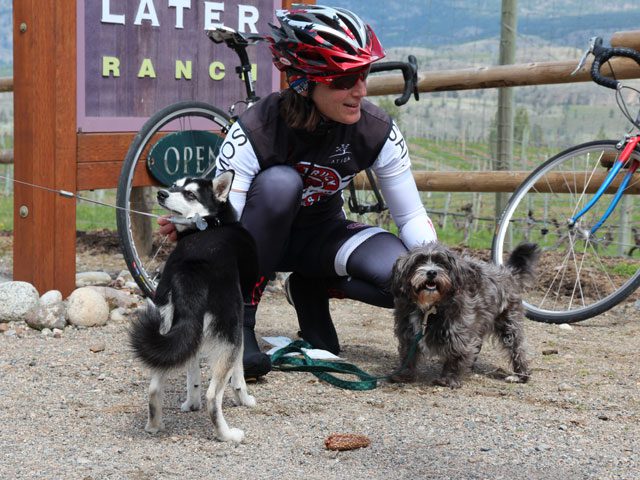 “I rode to Penticton, B.C., and back, 1,000 km in five days with friends,” Sydor said. “I also hiked the West Coast Trail. I run a women’s cycling camp each year, too. I’m enjoying having this time to get to do other things that I like a lot. When your racing days are over, cycling continues to be a social activity. That’s what it’s all about. For me, it isn’t the medals and stuff sitting on shelves that’s valuable: it’s about the people from my career I’ve stayed friends with. Sport is back to the way it started for me – it’s about being healthy and social.”
“I rode to Penticton, B.C., and back, 1,000 km in five days with friends,” Sydor said. “I also hiked the West Coast Trail. I run a women’s cycling camp each year, too. I’m enjoying having this time to get to do other things that I like a lot. When your racing days are over, cycling continues to be a social activity. That’s what it’s all about. For me, it isn’t the medals and stuff sitting on shelves that’s valuable: it’s about the people from my career I’ve stayed friends with. Sport is back to the way it started for me – it’s about being healthy and social.”
